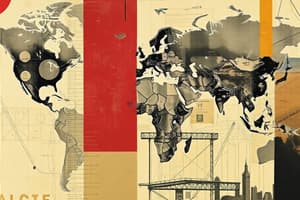Podcast
Questions and Answers
How has globalization impacted cultural exchange?
How has globalization impacted cultural exchange?
Facilitated increased cultural exchange and understanding among diverse nations and peoples, leading to greater tolerance and acceptance of differences.
What are some challenges associated with globalization according to the text?
What are some challenges associated with globalization according to the text?
Inequality, poverty, environmental degradation, and security challenges.
How has technological progress influenced the global economic landscape?
How has technological progress influenced the global economic landscape?
Rapid technological advancements have led to increased productivity and innovation.
What role do international organizations play in global governance?
What role do international organizations play in global governance?
Name one regional organization that promotes peace, cooperation, and development among member states.
Name one regional organization that promotes peace, cooperation, and development among member states.
What is globalization and how has it impacted contemporary world politics?
What is globalization and how has it impacted contemporary world politics?
What are the key aspects that define globalization?
What are the key aspects that define globalization?
How has economic integration impacted globalization?
How has economic integration impacted globalization?
What role do technological advancements play in globalization?
What role do technological advancements play in globalization?
How has globalization influenced cultural exchange?
How has globalization influenced cultural exchange?
What impact has globalization had on economic growth?
What impact has globalization had on economic growth?
Study Notes
Contemporary World Politics and Globalization
Globalization, a term that's been central to world politics over the last few decades, refers to the increasing interconnectedness of economies, cultures, and societies worldwide. This interconnectedness has led to a complex, dynamic, and at times contentious landscape in contemporary world politics.
Defining Globalization
Globalization is often defined by several key aspects:
- Economic integration: The free flow of trade, investment, and finance across borders, leading to the international division of labor and a growing interdependence among countries.
- Technological advancements: Rapid innovations in communication, transportation, and information technology have facilitated global integration and made the world more interconnected.
- Cultural exchange: Increasing interactions among societies, facilitated by global media, travel, and migration, have led to the spread of ideas, beliefs, and values across the globe.
- Political cooperation: The growing number of international organizations, treaties, and agreements has led to a more cooperative and interdependent global political landscape.
Impact of Globalization on World Politics
Globalization has profoundly shaped the modern world, bringing both benefits and challenges to countries and their citizens:
- Economic growth: Globalization has led to increased productivity and economic growth, benefiting many nations and lifting millions out of poverty.
- Trade and investment: Open markets and free trade have driven economic growth and job creation, while also leading to the emergence of multinational corporations that have a significant impact on global politics.
- Cultural exchange: Globalization has facilitated increased cultural exchange and understanding among diverse nations and peoples, leading to greater tolerance and acceptance of differences.
- Technological progress: Rapid technological advancements have led to increased productivity and innovation, shaping global economic and political landscapes.
However, globalization has also led to several challenges and concerns:
- Inequality: Globalization has disproportionately benefited developed countries and certain population groups, exacerbating socioeconomic inequalities both within and between nations.
- Poverty: Globalization has led to the concentration of poverty in certain regions, particularly among the least developed countries.
- Environmental degradation: Globalization has led to increased pollution, resource depletion, and damage to ecosystems around the world.
- Security challenges: Globalization has facilitated the spread of crime, conflict, and terrorism, leading to increased security concerns for nations and their citizens.
Governance and Globalization
As globalization continues to shape world politics, countries have sought to establish new forms of governance to address its challenges and benefits. Some important aspects of global governance include:
- International organizations: Global governance is facilitated by a wide array of international organizations and agreements, which seek to promote peace, cooperation, and development among nations.
- Multilateral diplomacy: Global governance is also facilitated by multilateral diplomacy, which seeks to foster cooperation among nations to address global challenges and promote mutual interests.
- Regional cooperation: Regional cooperation is an important aspect of global governance, with regional organizations such as the European Union, the Association of Southeast Asian Nations (ASEAN), and the African Union seeking to promote peace, cooperation, and development among member states.
In conclusion, globalization is a complex, multifaceted phenomenon that has profoundly shaped contemporary world politics. While globalization has brought significant benefits, it has also led to numerous challenges that require careful consideration and collective action. As the world continues to globalize, countries and their leaders must work together to address the challenges and benefits of globalization, ensuring a more peaceful, prosperous, and sustainable future for all.
Studying That Suits You
Use AI to generate personalized quizzes and flashcards to suit your learning preferences.
Description
Test your knowledge on the impact of globalization on contemporary world politics, including its key aspects, benefits, challenges, and governance mechanisms. Explore how economic integration, technological advancements, cultural exchange, and political cooperation have shaped the global landscape.




